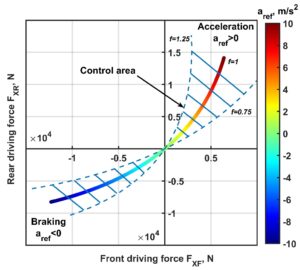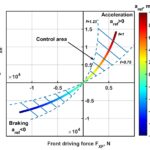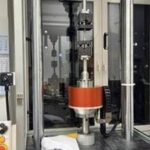
Semen Kopylov, Miha Ambrož, Žiga Petan, Robert Kunc, Sifa Zheng and Zhichao Hou
Proceedings of the Institution of Mechanical Engineers, Part D: Journal of Automobile Engineering. 2024
Abstract
Implementation of in-wheel motors brings numerous advantages: decreased overall vehicle weight and manufacture cost, available accurate torque control for better road handling and powertrain high energy efficiency. Even so, when the motor is placed inside the wheel, the unsprung mass of the vehicle increases, leading to a less comfortable ride. This paper puts forward and studies a control system that takes advantage of the vertical component of the driving force provided by an in-wheel motor to enhance ride comfort and handling dynamics. The proportional integral (PI) controller was proposed to minimize the pitch acceleration response of the vehicle. Controller’s gains were optimized using the gradient descent method with sequential quadratic programing algorithm. A co-simulation approach and a dynamic model of the vehicle were presented. Data regarding the vehicle’s measurements was taken from a real car with in-wheel motors. The dynamic model of the car was validated based on the results derived during the road test experiment. Assessing the controller’s effectiveness, a co-simulation approach between the dynamic model and the control system was established. An acceleration test in a straight line showed a 25% increase in ride comfort as measured by the RMS pitch angular vibrations of the sprung mass. The control is attained with no increase in the tire load and the vehicle’s longitudinal dynamics.









